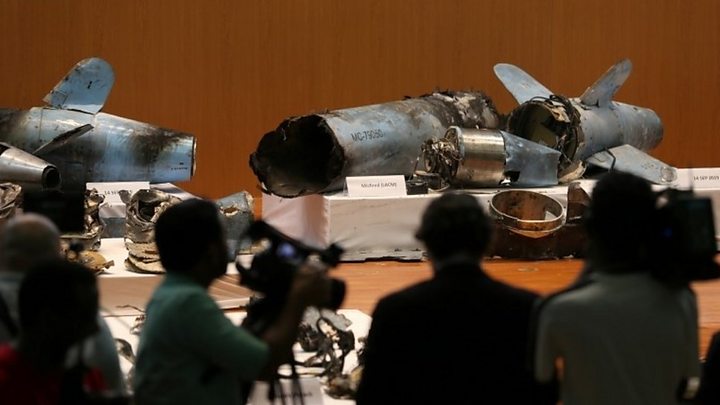Home » Middle East »
Saudis vow to respond to attack on oil sites
Saudi Arabia says it will respond with “necessary measures” to attacks on two oil facilities as it reiterated the accusation that Iran was behind them.
Minister of State for Foreign Affairs Adel al-Jubeir said the weapons used were Iranian and vowed to release the full findings of the investigation.
Iran denies involvement in the attacks.
Earlier, a senior Iranian military official said Iran was ready to destroy any aggressor after the US announced it was sending troops to Saudi Arabia.
Iranian-backed Houthi rebels in Yemen have said they were responsible for the drone and missile strikes on 14 September that affected the global oil supply.
Tensions between the US and Iran have escalated since US President Donald Trump abandoned a deal limiting Iran’s nuclear activities last year and reinstated sanctions.
Saudi Arabia: ‘Take a stand’
Speaking to reporters in Riyadh, Mr Jubeir said Saudi Arabia was in consultation with its allies and would take necessary and suitable measures after its investigation was complete, without giving details of possible actions.
He repeated that the strikes targeting the Abqaiq oil facility and the Khurais oil field had come from the north and not from Yemen but did not give a specific location, and urged the international community to take a stand.
“The kingdom calls upon the international community to assume its responsibility in condemning those that stand behind this act, and to take a firm and clear position against this reckless behaviour that threatens the global economy,” he said.
The Saudi defence ministry showed off on Wednesday what it said were the remains of drones and cruise missiles proving Iranian involvement.
The US has also accused Iran of being behind the attacks, and unnamed senior officials have told US media that the evidence suggests the strikes originated in the south of Iran.
On Friday, Secretary of Defence Mark Esper said the US would send a yet-to-be-decided number of troops to Saudi Arabia to boost the country’s air and missile defences.
President Trump then announced new sanctions against Iran, focusing on the country’s central bank and its sovereign wealth fund, while signalling that he wanted to avoid military conflict.
Iran: ‘We’ll pursue any aggressor’
Earlier, the head of Iran’s Revolutionary Guard in Iran, Maj Gen Hossein Salami, warned that the country’s “readiness to respond to any aggression is definitive”.
“Be careful, a limited aggression won’t remain limited. We’ll pursue any aggressor,” he said at the opening of an exhibition of captured drones in the capital, Tehran. “We’ll continue until the full destruction of any aggressor.”
Speaking at the same event, the head of the Guards’ aerospace branch, Brig Gen Amirali Hajizadeh, said the US ought to learn from its past failures and that any attack on Iran would receive “a crushing response”.
Iran’s Revolutionary Guard Corps (IRGC) are an elite branch of Iran’s military and have been designated a terrorist organisation by the US.
A game of brinkmanship
Analysis by Sebastian Usher, BBC Arab affairs editor
Iranian officials – both political and military – have issued a series of fierce warnings about any potential attack on their territory.
The US has adopted a less confrontational tone, but has continued with the Trump administration’s policy of applying maximum pressure.
New sanctions targeting Iran’s national bank and the mobilisation of more US troops in the Gulf are all part of this strategy.
What seems clear is that this remains a game of brinkmanship, with all sides still hoping to be able to pull back from a direct military confrontation. But the pattern of dangerous escalation over recent weeks does not bode well for this strategy.
The background you need
The Houthis have repeatedly launched rockets, missiles and drones at populated areas in Saudi Arabia. They are in conflict with a Saudi-led coalition which backs a president who the rebels had forced to flee when the Yemeni conflict escalated in March 2015.
Iran, the regional rival of Saudi Arabia, is an opponent of the US, and tensions between the two have risen markedly this year. The US said Iran was behind attacks on two oil tankers in the Gulf in June and July, as well as on another four in May – accusations rejected by Tehran.
Source: Read Full Article



